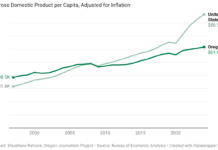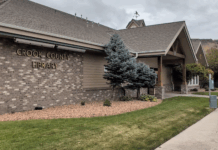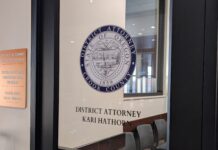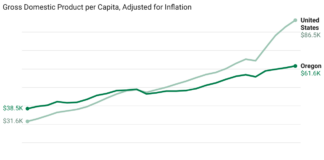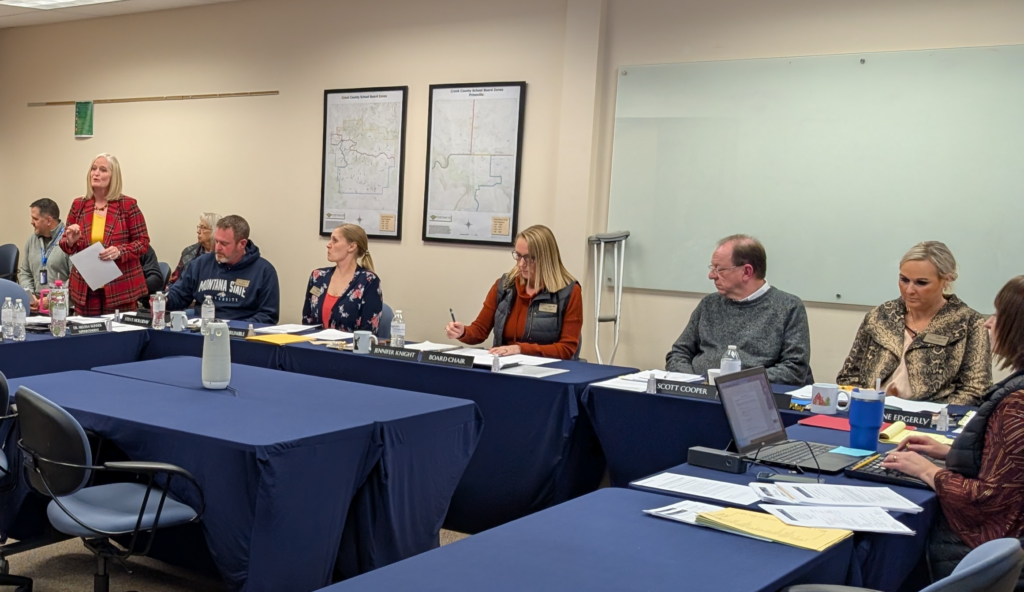
Prineville, Ore. – The Prineville Review discovered earlier this week that that the Crook County School Board likely violated provisions of Oregon’s public meetings law with its use of executive sessions, potentially since last year, including during another executive session that took place on Monday.
The discovery comes amid the Prineville Review’s ongoing county-wide investigation into citizen reports earlier this year that alleged systemic issues by governing bodies complying with critical parts of the state’s open meetings law, part of what are often referred to “sunshine laws”. Part of the current issues in Crook County often include the failure by many public bodies, especially special districts, to provide proper notice so the public is even aware of meetings, and improper uses of executive sessions.
The school board’s executive session on Monday was reportedly held under ORS 192.660(b), “To consider the dismissal or disciplining of, or to hear complaints or charges brought against, a public officer, employee, staff member or individual agent who does not request an open hearing.”
Under the law, such an executive session must include written notice (separate from the general notice requirements under the public meetings law) to the public official which is affected, providing them the opportunity to require the governing body hold the session publicly.
While the news media is permitted in executive session, we generally cannot currently reveal the contents of the executive session discussions. We did however learn through other sources that the hearing was part of an ongoing series of complaints made against Athletic Director Rob Bonner at Crook County High School.
Comments made during the executive session (which we cannot reveal) led the Prineville Review to question the board to confirm if it had actually provided the required written notice to the public official (staff member) for which the session was about That notice must not only inform the staff member of the hearing, it must also provide them an opportunity to require a governing body to meet in public.
The provision to require a public meeting is most often used when a public official may believe that the elected officials conducting a review may act more favorably when faced with public transparency in the process.
“In order to afford to the chief executive officer of any public body, a public officer, employee, staff member or individual agent the opportunity to request an open hearing under ORS 192.660(2)(b) or (i), the public official must receive written notice of the meeting no less than one business day or 24 hours, whichever is greater, in advance of the meeting.” – OAR 199-040-0030
According to two sources, both of which spoke on the condition of anonymity due to fear of retribution due to their ties to the district, the complaint against Bonner pertained to his handling of a complaint from a parent in late 2023 regarding former volleyball coach Jessica Mumm who faced allegations of inappropriate conduct and bullying.
Mumm resigned earlier this year, though the complainant reportedly alleged school officials likely allowed her to resign in an effort to avoid formally terminating her as a coach amid the allegations, according to a third source. The Prineville Review is still working to obtain additional information concerning the original complaint.
The Central Oregonian reported earlier this year that Bonner made clear that Mumm had made the decision to step down as a coach and was not forced out by the district. It also reported she would be staying in her role as a teacher for the school district and as an assistant track coach at Crook County High School.
“It’s unfortunate that Jess isn’t coming back for year two,” said Bonner to the Central Oregonian in January. “She’s doing what she has to do for her family, and I wish her the best. Everything we do is what is best for our family.”
At the end of the executive session, the Prineville Review asked the board for confirmation on the matter of providing the employee notice to require a public session (it is customary for reporters to engage in clarifications about executive session compliance and if some matters may also be subject to disclosure).
We’ve reached out to Bonner for comment early Thursday but have not hear back prior to press time. It was unclear if Bonner had been made aware of questions raised regarding the notice and if he had been provided proper notice for past executive sessions under ORS 192.660(2)(b) or (i) which involved himself.
Board Chair Jennifer Knight admitted to the Prineville Review on Wednesday that the board went back into executive session under ORS 192.660(2)(b) at the end of its public meeting, despite the questions on if it’s earlier (2)(b) executive session that took place prior to the public meeting. Knight stated the board believed the executive session was properly noticed and called, but wasn’t specific if she was referring to the general requirements for executive session notice, or the notice specifically required in a (2)(b) session to the public official.
“The board reconvened into executive session under ORS 192.660(2)(b) following the board meeting. The board heard your concerns. As you are aware the executive session was called to decide whether to proceed with hearing a complaint against staff members,” said Knight.
Knight also explained that they had paused further consideration of the appeal (which it has since revealed it intends to take up again on Monday).
“You raised an issue concerning the application of OAR 199-040-0030 to the executive session board that occurred on December 9, 2024. The Board has decided to pause further consideration of an appeal under Step 4 of KL-AR in response to a parent complaint against staff members, in order to look into your concern, determine appropriate next steps, and ensure compliance with Oregon law,” Knight explained.
Director Scott Cooper explained the session was simply a continuation of the earlier executive session, although containing the executive session could still be a second and more intentional violation if the board realized it failed to provide notice to Bonner.
“The board had not concluded its discussion as the start time for the regular meeting approached. The board continued the meeting to pick up where we left off at the conclusion of the regular board meeting,” Cooper told the Prineville Review by email.
Cooper then confirmed it used that portion of executive session to speak not about the review authorized specifically by (2)(b) of a public official, but instead to discuss the concern raised by the Prineville Review, which again raised questions on if such discussion was allowed under (2)(b) itself.
“When we briefly re-convened into the executive session after the meeting, we agreed that while we didn’t necessarily agree with your interpretation, there was no harm in accommodating you and rescheduling and redoing the entire hearing from start to finish,” Cooper also revealed. “That is the meeting that is now set up for Monday night, which will be a new executive session and not a continuation.”
The Board had provided proper public notice and specific notice to the Prineville Review of the executive session in the days prior. The issue raised was regarding the notice to Bonner that would allow him to request the open session.
“One of the issues you raised Monday night was whether written notice has to be given to targets of complaints with an opportunity to request a hearing. That is certainly what the statute says,” Cooper remarked. “There is, however, a nuance. The board does not start hearing the complaint until it has decided whether to accept the appeal–which was the sole purpose of Monday night’s executive session.”
According to ORS 192.660(2), the governing body of a public body may hold an executive session only for specific provisions. Subsection (b) states “To consider the dismissal or disciplining of, or to hear complaints or charges brought against, a public officer, employee, staff member or individual agent who does not request an open hearing,”
We again asked Director Cooper to further explain what specific statute makes distinctions for the types of (2)(b) hearings, specifically the claim that the district is only within the process of considering an “appeal”, but he did not respond further.
The Prineville Review had also uncovered similar violations under ORS 192.660(2)(b) earlier this year by the Crook County Cemetery District, violations that prompted a lawsuit from its now former manager. The sessions themselves were also not noticed generally and failed to provide specific notice to the Prineville Review which requested notice just days earlier. The cemetery district later admitted to those violations, although its two directors at the time are now under a preliminary investigation by the Oregon Government Ethics Commission.
State ethics officials give different interpretation of the executive session provisions
We also reached out to the Oregon Government Ethics Commission for information, including any case law or exceptions that would point to the school district’s claim that it could hold the type of executive session it did under (2)(b) without notice to an affected public official. According to the OGEC, there are zero exceptions to the notice requirement to the public official when holding executive sessions held under ORS 192.660(2)(b) or (i).
“There is no exception and there is an administrative rule saying when they have to give the notice and how much notice they need to give [the public official],” said OGEC Executive Director Susan Myers.
“The rule is OAR 199-040-0030,” Myers confirmed. She also confirmed that the notice provides the official with the opportunity to require the governing body to hold the session in public and not in executive session, thus allowing them and non-media members to be present.
This would also ensure their deliberations and decisions are an absolute public record, as public bodies maintain strong legal productions against disclosing minutes for an executive session, including to the news media.
While we still will not reveal particulars of the executive session, after consultation with our own legal counsel, we decided to reveal that the discussions were clearly involved comments regarding potential disciplining of the public official and speaking about the ultimate complaint, as well as other matters that were not relevant to the executive session itself.
We also asked Myers generally (we didn’t disclose the specific public body in this case) if reentering executive session at a later time during the same day was considered a “continuation” or was a separate executive session that required proper notice of the reasons for holding the executive session, a issue also raised with the board.
Myers confirmed that there was no such “continuation” of an executive session, and reentering executive session carries all of the same legal requirements under ORS 192.660.
“It would have to be a new executive session,” said Myers.
We also asked if ORS 192.660(2)(b) would also have been a violation if used for a body to discuss the issue of having made proper notice under the administrative rule, and if they could have held a different type of session related to its legal rights. As Cooper confirmed, the board did go back into executive session at the end of its public meeting and discussed the issues raised about notice to the public official affected under the administrative rule.
“It wouldn’t necessarily even qualify under (2)(h) if there isn’t litigation, or litigation likely to be filed. They [a public body] could potentially have held a (2)(f) session to review a written communication and recommendation from its attorney.
That seems to confirm that not only did the board likely twice violate the rules by not providing notice to Bonner, the subsequent session after the public meeting portion also did not even qualify for executive session under (2)(b).
The Board also ignored questions about its past practices of providing its staff the required written notice in the past. We have since submitted requests for records off all written notices required cited administrative rule to public officials.
Note: This story was updated shortly after initial publication to correct typos and provide better context as to the current issues related to public meetings compliance in Crook County.
This is a developing story which you can count on us to keep you updated on. Join the discussion on Facebook or X (formally Twitter).
Mr. Alderman is an investigative journalist specializing in government transparency, non-profit accountability, consumer protection, and is a subject matter expert on Oregon’s public records and meetings laws. As a former U.S. Army Military Police Officer, he brings a disciplined investigative approach to his reporting that has frequently exposed ethics violations, financial mismanagement, and transparency failures by public officials and agencies.


